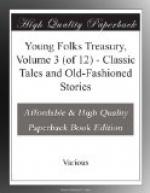Mrs. Collier was standing at the window when the carriage stopped, and looking earnestly at her niece suddenly exclaimed in a tone of rapture: “My child! My child! My lost Eliza!”
Mr. Darnley, who was reading, sprang from his seat, and flew to the door in a ecstasy of joy. In less than a minute he returned folding his Eliza to his throbbing heart. The joyful intelligence ran through the house, and the other children impatiently flew to this scene of transport.
To describe their feelings or express their felicity would require the aid of the most descriptive pen, and even then would be but faintly told, and therefore had much better be passed over.
From that moment the children all unanimously agreed strictly to attend to their father’s orders, and never in the slightest instance act in opposition to his will.
Mr. and Mrs. Montague were laden with caresses, and earnestly entreated to remain Mr. Darnley’s guests. The hospitable invitation would have been gladly accepted had not the thoughts of the poor children who were still at Wycombe seemed to claim his immediate attention, and so great was the philanthropy of Mr. Montague’s character that he could never rest satisfied if a single duty remained unfulfilled.
DICKY RANDOM
OR GOOD NATURE IS NOTHING WITHOUT GOOD CONDUCT
“In festive play this maxim prize—
Be always merry—always WISE!”
“Do you know what hour it is when you see a clock?” said Mr. Random to his little son Richard.
“Yes, father,” said Richard; “for I can count it all round. When both hands are at the top of the clock, then I know it is time to leave school.”
“Then go and see what time it is,” said his father.
Away ran Richard, and brought back word in a moment that it was exactly six o’clock.
In a few minutes after came in a friend with a young lady, the former of whom asked Mr. Random why he was not ready to go with them to the concert that evening, as he had promised. Mr. Random replied that it was but six o’clock, which, however, he was soon convinced was a mistake of Richard’s, who, on being asked what he saw when he looked on the clock, replied, “I saw the two hands together close to the six, and that made me say it was six, for I always call it twelve when they are right opposite.”
“Remember, my dear,” said his father, “that the long hand never tells the hour, except on the stroke of twelve. You ought to know that the minute hand overtakes its fellow somewhat later every hour, till at noon and midnight they again start exactly even; and when a bigger boy I shall expect you to tell me how much difference is increased every time they come into conjunction. You now see, Dicky, that through such a mistake I must make my friends wait; pray, therefore, mind better another time.”
In a few minutes after his father bid him go into the dining-room, and bring down a bottle of wine, which stood in the hither corner of the cellaret, that he might help the gentleman, and lady to a glass.




